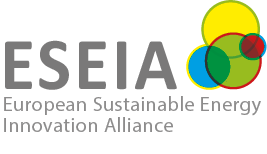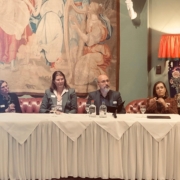ESEIA Panel Discussion: Strategies to Enhance Future Effectiveness in Sustainable Energy Innovation
On 19 November 2024, the European Sustainable Energy Innovation Alliance (ESEIA) convened a pivotal panel discussion titled “Maintaining Future Effectiveness of ESEIA” at the Club University Foundation in Brussels. This event was part of ESEIA’s 15th-anniversary celebrations, bringing together key stakeholders to deliberate on the alliance’s future trajectory in advancing sustainable energy systems.
Panel Composition:
- Chair: Brian Norton, ESEIA President
- Panelists:
- Ana Picado, LNEG
- Paola Mazzucchelli, CIRCE
- Pedro Fardim, President of the European Polysaccharide Network of Excellence (EPNOE)
- Brigitte Hasewend, ESEIA Director
Key Discussion Points:
- Overcoming Fragmentation in Research and Innovation: The panel addressed the barriers to an open market in research, innovation, and knowledge, as highlighted by Enrico Letta’s concept of the “5th Freedom.” Paola Mazzucchelli emphasized the role of European thematic alliances like ESEIA in bridging gaps between academia, industry, and policymakers, fostering a cohesive innovation ecosystem.
- Enhancing Skills Training: Reflecting on the Draghi report’s insights into Europe’s competitiveness, Ana Picado underscored the necessity for practice-oriented training programs. She proposed that ESEIA develop targeted training for professionals and students in areas such as renewable energy technologies and sustainable urban planning to address existing skill gaps.
- Accelerating Green Deal Implementation: Discussing Manuel Heitor’s report on the future Framework Programme 10 (FP10), Pedro Fardim highlighted ESEIA’s potential to align with the European Innovation Council’s objectives. He suggested that ESEIA could act as a catalyst for accelerating the implementation of the Green Deal by facilitating collaborative projects and disseminating best practices.
- Engaging Younger Generations: Brigitte Hasewend emphasized the importance of involving younger generations in sustainable energy innovation. She proposed initiatives such as mentorship programs, innovation challenges, and partnerships with educational institutions to inspire and equip future leaders in the field.
- Fostering Dialogue with European Citizens: The panelists collectively recognized the need for ESEIA to enhance its engagement with European citizens. They recommended organizing public forums, leveraging digital platforms, and collaborating with local communities to raise awareness and encourage participation in sustainable energy solutions.
Audience Engagement:
The session concluded with an interactive Q&A segment, where attendees engaged with the panelists on topics ranging from policy integration to community-based energy projects. This exchange underscored the collaborative spirit essential for ESEIA’s continued effectiveness in promoting sustainable energy innovation across Europe.
The panel discussion served as a strategic platform for ESEIA to reflect on its achievements and chart a course for future endeavors, reinforcing its commitment to driving sustainable energy solutions through collaboration and innovation.
ESEIA Team: office@eseia.eu



